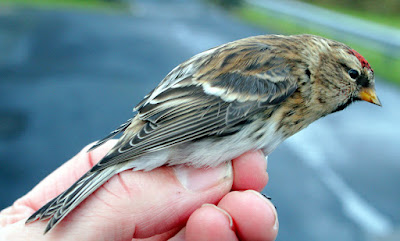That’s all we seem to get lately, one day in seven suitable for ringing, the rest too windy, wet, or more likely, both.
Wednesday 13th had been pencilled in since last Saturday as it looked the most promising this week; so it proved with our meet at Oakenclough for 0630 in cold but wind-free conditions.
Once again nets were set in the dark in the hope of intercepting early thrushes, ex-roost or morning migrants. We caught three Redwings in the early half-light and three more throughout the morning, the latter ones from migrants arriving from the north-west. In all we counted approximately 160 Redwings, the largest party one of 40+ that sped south without stopping.
Just one Fieldfare noted this morning, calling in the half light of the first arrivals.
Otherwise, visible migration was limited to 20+ Chaffinch, similar numbers of Greenfinch, and a couple of Lesser Redpoll. And where are the Siskins this year? We have yet to record an autumn Siskin on overhead migration and have a zero count for ringing.
Totals today: 6 Redwing, 5 Blue Tit, 4 Greenfinch, 3 Lesser Redpoll, 2 Coal Tit, 2 Blackbird, 1 Goldcrest - 23 caught of 7 species,
Goldcrest
Redwing
Lesser Redpoll
Greenfinch - First year male
The protozoal parasite Trichomonas gallinae was known to infect pigeons and raptors but beginning in Britain in 2005, carcasses of dead Greenfinches were found to be infected with the parasite. The disease spread, and in 2008 infected carcasses were found in Norway, Sweden, Finland, and a year later in Germany.
In Britain the number of infected carcasses recovered each year declined after a peak in 2006. The disease hit the population hard, with decline of "more than 20%" in regional breeding populations during the year following the outbreak.
The decline in my local area here in Lancashire was especially noticeable. Many observers thought it a “crash” in population rather than a decline. Greenfinch numbers have yet to fully recover, as shown on the attached table from British Trust for Ornithology.
Greenfinch - BTO
BBS - Breeding Bird Survey
CBC - Common Bird Census
CES – Constant Effort Scheme (Ringing)
My own observations this year and last is of a slight recovery. As an example, I saw a 90+ single flock of Greenfinches at Cockerham just last week and the species is now in our garden again on a fairly regular basis.
Other species seen this morning – Tawny Owl, Pied Wagtail, Sparrowhawk, Great-spotted Woodpecker.
Pied Wagtail
Back soon on another day at Another Bird Blog.


































4 comments:
Hello,
Great sightings! I love the cute Goldcrest and the Redpoll. The Redwing, Greenfinch and Wagtail are all pretty too. Enjoy your day and week ahead!
Hello Phil: It is interesting that your sighting of a Tawny Owl is included almost as a footnote at the end of this account. This is a species that I am sure would rank as a triumphant first on many people's lists. This gloomy weather and its inhibitory effect on your banding activities must become quite depressing after a while. I can understand your frustration. Here we have snow and it has turned cold...cold, that is for the first half of November...but it is pleasant, with sunshine, and we had our normal Tuesday walk yesterday under agreeable conditions, with a nice variety of species. I hope things change for the better for you.
Pomimo złej pogody ty nadal dzielnie badasz przeloty ptaków. Nie czytałam, czy Ty robisz to zawodowo, czy amatorsko?
Gratuluję droździka (Redwing )!
Our weather in the UK has not been good has it!
Everywhere is so waterlogged … and of course many areas have experienced terrible flooding … and now for some they have snow!!!
Certainly doesn't help you with your birding, although I did enjoy the selection of photographs you included in your post.
Keep well, and stay warm.
All the best Jan
Post a Comment